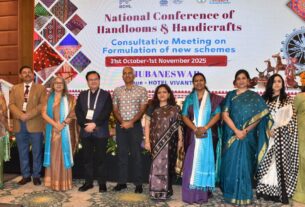Bhubaneswar: In a landmark achievement for Odisha’s agriculture sector, the state successfully exported three mango consignments in a single day to international destinations, London and Birmingham in England, and Dubai in UAE. This marks the first time Odisha has carried out such a coordinated export of mangoes to multiple global markets within 24 hours.
The development is being hailed as a turning point for the state’s agri-export strategy, reflecting growing capabilities of local Farmer Producer Organizations (FPOs) and the impact of targeted institutional support.
In Balangir district, known as the home constituency of the Deputy Chief Minister, 2 metric tonnes of mangoes were exported to London, the first-ever mango export from the district.
This shipment followed an intensive capacity-building programme earlier this month in Patnagarh, where farmers and FPOs were trained in export-oriented post-harvest practices, quality control, and global standards. The initiative was facilitated by Palladium, a development organization playing a key role in enhancing international market access for farmers across the region.
Meanwhile, in Sambalpur, 3.5 metric tonnes of premium mangoes were flagged off to England and Dubai by Union Minister Dharmendra Pradhan, Minister for Education, Skill Development and Entrepreneurship, during the ongoing Mango Festival celebrations.
The flag-off event was attended by senior officials from NABARD, the Department of Horticulture, Sambalpur District Administration, and Palladium India.
“This is not just the export of mangoes; it is the export of our farmers’ hard work, dedication, and dreams,” said Pradhan. “Odisha is fast emerging as a trusted supplier of high-quality agricultural products. By connecting our farmers—especially women—to global markets, we are creating pathways to better livelihoods and sustainable rural prosperity.”
These developments highlight the growing success of Odisha’s horticulture strategy, which emphasizes crop diversification, high-value produce, and export-readiness. Under the leadership of the Horticulture Department, farmers have been receiving training in branding, SOP implementation, and packaging, preparing them to meet the expectations of global markets. Palladium has served as a key facilitator in these efforts, offering end-to-end support that includes buyer linkage, export documentation, and on-ground technical training.
In continuation of this momentum, NABARD, in collaboration with Palladium India, organized an Export Sensitization Workshop on May 24, 2025, at the Horticulture Training Institute in Nildunguri, Sambalpur.
The workshop was aimed at strengthening the export capabilities of FPOs involved in the mango value chain by equipping them with critical knowledge, skills, and international market connections.
The event began with the registration and onboarding of participants, coordinated by the Palladium team. The District Development Manager (DDM) of NABARD, Sambalpur, delivered the welcome address, highlighting the district’s untapped potential in horticultural exports.
This was followed by a context-setting address by a Palladium India representative, who outlined the shared objectives of the workshop and the collective effort needed to mainstream FPOs into the global export ecosystem.
“FPOs are the future of rural entrepreneurship. With proper handholding, such as the collaborative effort we are witnessing between NABARD and Palladium, we can transform our farmers into global suppliers,” said the DDM of NABARD, underlining the importance of institutional partnerships in creating long-term export viability for rural producers.
The inaugural session featured a keynote by the Regional Director (East Region) of APEDA, who emphasized the need to sensitize farmers about export-oriented fruit and vegetable production. “The more FPOs are sensitised, the greater the benefits for farmers and the higher the export volumes from the state. We aim to facilitate direct exports through FPOs in the near future by providing comprehensive training and support throughout the export process. This initiative will inspire FPOs and significantly enhance exports across the state,” he stated.
Adding further weight to the day’s proceedings, the Chief General Manager of NABARD addressed the gathering, stressing the government’s vision to make agricultural exports a cornerstone of rural economic development.
“Mango exports are taking place at a significant scale in many states, and I would like to see Odisha reach a similar level of export excellence. I am particularly pleased that this workshop, which usually takes place in Bhubaneswar, was organized at the district level—bringing valuable insights directly to the farmers,” he said.
He encouraged participants to engage proactively with marketing bodies, government agencies, and institutions like NABARD and Palladium to enhance their export readiness. He also extended appreciation to Palladium for organizing the event and for providing critical on-ground marketing and training support to the farming community.
The Deputy Director of Horticulture, Sambalpur, also addressed the participants, offering a detailed overview of the infrastructure and support systems available to promote mango exports from the district.
Participants later attended a specialized session led by seasoned exporters, which focused on the key market requirements for international mango trade — including compliance with quality standards, certifications, buyer expectations, and packaging protocols.
A comprehensive presentation on Standard Operating Procedures (SoP) for post-harvest handling, packaging, and logistics was delivered by Palladium India. The SoP outlined critical steps such as sorting, grading, de-sapping, hot water treatment, and traceability protocols to ensure the produce meets global quality benchmarks. This session gave FPOs a clear roadmap to align their practices with international buyer requirements.
To reinforce this knowledge, the workshop featured a live, on-field demonstration of post-harvest practices conducted by Palladium experts. Participants witnessed best-in-class techniques in action — including sorting, cleaning, quality assessment, and export-grade packaging.
The hands-on session allowed FPO representatives to clarify doubts, engage with technical experts, and explore ways to scale up their export potential using newly learned techniques.
The workshop concluded with a vote of thanks delivered by the Assistant General Manager of NABARD, followed by a networking lunch session that facilitated peer learning and further discussions on export opportunities.
With this milestone, Odisha has firmly positioned itself on the international map for mango exports. As collaborative efforts between FPOs, government departments, NABARD, and market enablers like Palladium continue, the state is expected to witness a sharp rise in the volume and value of its horticultural exports, bringing new income opportunities for farmers and contributing to long-term rural prosperity.



